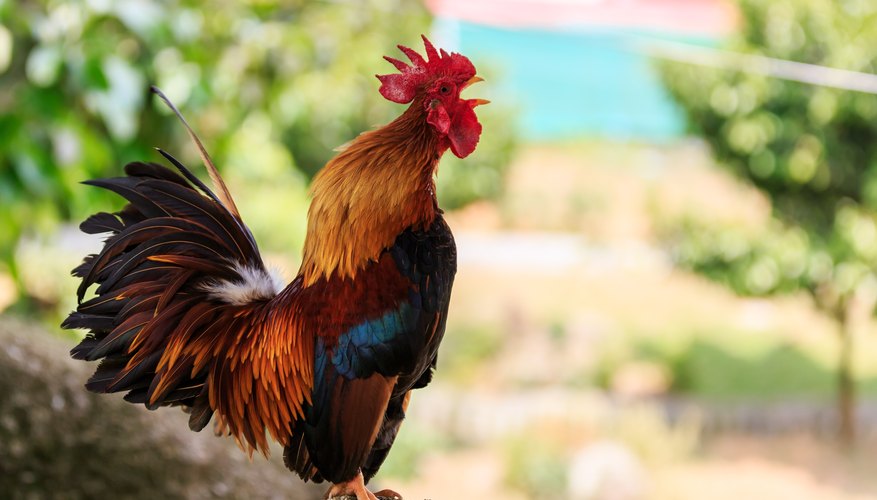
Raising game chickens for show or profit is achievable--with a little bit of work. While you may not make a million dollars through this backyard endeavor, it can provide a turnaround on your initial investment. The history of game chickens dates back to the days when game chickens were bred for cockfighting, which is now illegal in all 50 states. Raising game chickens differs slightly from raising production chickens.
License to raise chickens
Chickens
Brood box
Heat lamp
Chick starter feed
Coop
Chicken run
Feed
Hay
Male game chickens can be aggressive when penned with other males and start battling each other until serious injury or death. If you're planning on having more than one male game bird, keep them separate from each other by tethering them to a pole within easy reach to food and water.
Coops must be cleaned out weekly. Protect your chickens by constructing a 4-foot tall wire fence enclosure to keep out predators. Be aware that some predators like weasels and raccoons can climb. Securing the overhead chicken run with chicken wire is advisable.
Check with your county's local agricultural or planning department to see if raising game chickens is allowed in your area. Game chickens are primarily raised for breeding and showing as it is illegal in all 50 states to raise them for fighting.
Secure the chicken coop and enclosure. Review the fencing to ensure the wire is small enough to prevent access by predators--as some predators are very handy and can get through most anything. Secure the bottom fencing by digging down about a foot and installing the wire below the surface of the ground. Lay down a fresh layer of hay and make room for the chickens to scratch and run during the day.
Provide adequate coop space for each chicken. Each chicken needs five square feet of space inside the coop. Prepare nesting boxes for the chickens to lay eggs (with a lockable hatch for accessing the eggs from behind). Attach a heat lamp to the brood box and place chick starter feed and a regular supply of water within easy reach for the new chicks for the first six weeks.
Choose the number of chicks. On average, one egg-laying chicken will produce five to six eggs per week. Purchase young chicks from a local hatchery, farm or feed store. Game chicken varieties such as Asil, White Silkie Bantams or Speckled Sussex, can be ordered online through various mail-order hatcheries offering hatching eggs and young chicks.
Check with local transportation restrictions since there can be laws that prohibit livestock being transported across state lines.
Nutrient-rich game fowl feed can be purchased at any local farm or feed store. Chickens must have 24-hour access to fresh food and water daily.
Market your game chickens by placing newspaper ads for breeders, meat or eggs. When deciding which breed of game chickens to raise, take note whether it is a good meat bird or egg producer. Game chickens regularly shed feathers which can also be used to make crafts to sell at local shows and farmer's markets such as jewelry, fishing lures, tribal decor and pens. You can also contact your local agricultural department to find local exhibitions and fairs to show your game chickens.
Items you will need
Tips
Warnings
References
Writer Bio
Rachel Turner has been writing professionally since 2000, focusing on gardening and home improvement topics. Her articles have appeared online at SlowTravel and in publications such as the "Arkansas Gardeners," "One Step Ahead" and "Writers Now." Turner holds a Bachelor of Arts in English from Arkansas State University.



